

Our joints perform impressive feats every day – enabling every movement, every step, every turn. Yet many people experience limitations in their mobility over the course of their lives. The figures speak for themselves: More than half of the German population is affected by joint problems, and around 17% even suffer from osteoarthritis.
In this context, MSM is increasingly becoming the focus of research. But what is really behind the effects of MSM? Here you will learn how MSM works, why it is so important for your joints, and what you should pay attention to when using it.
Table of contents
MSM is a natural sulfur compound found in every organism and is particularly concentrated in joints, cartilage, and connective tissue.
Studies show promising results regarding the effects of MSM on joint health
Diet alone is often not enough: Especially in cases of joint diseases and inflammation, the need for sulfur may be increased.
Pay attention to high-quality products and stick with it: The full effect is only achieved with long-term MSM intake.
Why your body needs MSM
MSM (methylsulfonylmethane) is a natural sulfur compound found in every living organism, including your body. Sulfur is more important than most people realize: after calcium and phosphorus, it is one of the most abundant minerals in your body.
Particularly noteworthy is its distribution in the body: Sulfur is found in higher concentrations in tissues involved in movement: in joints, cartilage, tendons, and connective tissue. There, it performs important functions:
- It serves as a building block for essential body structures.
- It contributes to the stability of connective tissue, bones and muscles.
- It is a component of important amino acids and proteins (1)

This finding highlights the close connection between sulfur supply and joint health and explains why the effect of MSM is so relevant, especially in the case of joint problems.
MSM's effect on joints: What science says
MSM for inflammation in the musculoskeletal system
Chronic inflammation plays a central role in joint diseases such as osteoarthritis. Even though osteoarthritis is primarily considered a degenerative joint disease, inflammatory processes contribute significantly to its progression and to the perception of pain. These inflammations further accelerate cartilage degeneration.
At the molecular level, MSM exerts its effects by interfering with specific inflammatory signaling pathways. Studies have shown that MSM can contribute to lowering various inflammatory mediators:
- Interleukin-6 (IL-6): An important inflammatory marker that is frequently elevated in osteoarthritis.
- Tumor necrosis factor-alpha (TNF-α) : Plays a central role in chronic inflammation
- Prostaglandin E2: Involved in pain and inflammatory responses (1, 2)
This means that MSM can help modulate chronic inflammation in joint diseases. In other words, it can not only suppress symptoms but also sustainably influence the inflammatory response.

MSM's effect on oxidative stress
Inflammatory processes lead to an increased production of free radicals, which can further damage cartilage and accelerate its degradation. Experts refer to this as oxidative stress – an imbalance between free radicals and the body's own protective mechanisms.
Studies have shown that MSM has a twofold effect:
- Direct neutralization : MSM can directly neutralize free radicals, thereby inhibiting their effects.
- Activation of the body's own protective systems : The effect of MSM activates the so-called Nrf2 signaling pathway, which can control the formation of the body's own antioxidants (3).
Of particular interest: Studies have shown that MSM can increase the concentration of glutathione , your body's most important antioxidant. Glutathione contains the sulfur-containing amino acid cysteine and is essential for protecting joints from oxidative damage (4).

MSM's effect on bone metabolism
What's exciting is that MSM can intervene at several points simultaneously. Preclinical studies have shown that MSM can influence the behavior of stem cells, the cells from which different tissue types can develop.
Under the influence of MSM, these stem cells increasingly developed into osteoblasts, cells actively involved in bone formation . Furthermore, MSM activates certain genes important for bone tissue regeneration . It also supports the incorporation of minerals into the bone structure. This is a crucial step in maintaining strong and healthy bones (5).
These findings suggest that the effects of MSM can support not only the cartilage, but the entire joint system.

Sulfur-containing foods vs. targeted MSM supplementation
Although sulfur is present in many foods, many people struggle to meet their needs in everyday life. Processed products, unbalanced diets, or increased requirements can lead to the body having less sulfur available than it needs. Furthermore, cooking or prolonged storage significantly reduces the sulfur content.
If you're unsure whether your sulfur intake is sufficient, a high-quality MSM supplement can help to specifically support it. Since sulfur is not stored in the body, a regular intake is particularly important to enable the positive effects of MSM.
The following overview lists some foods with a particularly high sulfur content that can contribute to your natural sulfur intake.
| Animal-based foods | Plant-based foods: |
| Eggs (especially the yolk) |
Garlic |
| Milk and dairy products |
Broccoli and other cabbage varieties |
| Fish |
asparagus |
| Meat |
potatoes |
When targeted MSM supplementation is advisable
- In cases of joint diseases : Chronic inflammatory processes and the breakdown of cartilage tissue can increase the need for sulfur.
- During intense exercise : Intense physical exertion leads to microtrauma in muscles and joints. At the same time, sulfur excretion via urine increases.
- With a low-protein diet : Since almost all sulfur-containing substances in the body are formed from the amino acid methionine, a low protein intake can also lead to an insufficient supply of sulfur.
- The liver is stressed : By long-term use of medications, alcohol or environmental toxins (7).

Taking MSM correctly: Tips for maximum effect
Taking MSM in powder or capsule form is a convenient way to specifically utilize its effects and optimally support your sulfur needs. Studies confirm that MSM is safe and well-tolerated (2, 3). Choosing high-quality products is important to ensure the full benefits of MSM.
How to recognize high-quality MSM
Numerous MSM products in powder or capsule form are now available on the market. It can be difficult to identify a high-quality product that delivers the optimal MSM effect.
Here's what you should look out for with MSM:
- Purity: At least 99% high-purity MSM ensures the full effect of MSM.
- Organic origin: Not synthetically produced
- Dosage : At least 1,600 mg MSM per daily dose for a therapeutically relevant MSM effect
- Bioavailability: Pay attention to the mesh factor of 40-80 for optimal absorption and MSM effectiveness.
- Additives : The declaration should be as small and transparent as possible.
Our recommendation
Practical tips for optimal MSM intake
- Cook fresh and gently : Avoid highly processed products, as ready-made meals often contain hardly any bioactive sulfur compounds.
- Consistency is key: Take MSM at the same time every day. This will make it a routine and allow the MSM to work optimally.
- Drink plenty of fluids : Take MSM with at least 200-250 ml of water to support absorption and the effect of MSM.
- Be patient: Give MSM at least 8-12 weeks to take effect. Studies show that MSM takes time to reach its full effect.
- Document your progress: Note your symptoms before and during the course of treatment. This will allow you to realistically assess the effects of MSM.
- Think holistically : The effects of MSM do not replace exercise, weight management and a healthy diet for healthy joints - they complement them effectively.
Conclusion
MSM is an organic sulfur compound and has shown promise in clinical studies for joint health. MSM's effects demonstrate great potential due to its anti-inflammatory and antioxidant properties, as well as its ability to provide optimal sulfur compounds.
Your joints carry you through life – every day, every step. It's worth taking good care of them.
Our expert
How long does it take for MSM to take effect?
The effects of MSM develop gradually: Initial improvements may be noticeable after 2–4 weeks. The full effect is usually seen after 8–12 weeks of regular intake.
Is MSM safe to use?
Yes, MSM is considered very well tolerated. Side effects are rare and usually mild (e.g., bloating or stomach irritation). It does not accumulate in the body and is completely excreted.
Can MSM be taken long-term?
Yes. Since sulfur is needed regularly and is not stored, long-term intake of MSM is beneficial if well tolerated – especially in cases of chronic joint problems or high physical stress.
Is MSM also suitable for athletes?
Definitely. Studies show promising results regarding MSM's effects on regeneration and micro-injuries in muscles.
Which is better: MSM capsules or powder?
MSM powder offers flexible dosing but has a slightly bitter taste. Capsules are tasteless, convenient, and ideal for on-the-go use. They also offer greater protection against oxidation.
How can you recognize a high-quality MSM product?
Look for: High purity (≥ 99%), organic origin, appropriate dosage, high bioavailability (mesh factor 40–80) and
Transparent manufacturer information.
How can I holistically promote my joint health and mobility?
MSM is an important component for healthy joints, but other factors play a central role in long-term mobility: sufficient exercise, a balanced diet and a healthy body weight.
References for further reading
- Toguchi A, Noguchi N, Kanno T, Yamada A. Methylsulfonylmethane Improves Knee Quality of Life in Participants with Mild Knee Pain: A Randomized, Double-Blind, Placebo-Controlled Trial. Nutrients 2023; 15(13). doi: 10.3390/nu15132995.
- Debbi EM, Agar G, Fichman G, Ziv YB, Kardosh R, Halperin N, et al. Efficacy of methylsulfonylmethane supplementation on osteoarthritis of the knee: a randomized controlled study. BMC Complement Altern Med 2011; 11:50. doi: 10.1186/1472-6882-11-50.
- Butawan M, Benjamin RL, Bloomer RJ. Methylsulfonylmethane: Applications and Safety of a Novel Dietary Supplement. Nutrients 2017; 9(3). doi: 10.3390/nu9030290.
- Klihada F. Relationship between Glutathione and the Immune System. Oxidants and Antioxidants in Medical Science, 2023; 12(1):1–2.
- Aljohani H, Senbanjo LT, Chellaiah MA. Methylsulfonylmethane increases osteogenesis and regulates the mineralization of the matrix by transglutaminase 2 in SHED cells. PLoS One 2019; 14(12):e0225598. doi: 10.1371/journal.pone.0225598.
- Biesalski HK, Grimm P, Nowitzki-Grimm S, eds. Pocket Atlas of Nutrition. 8th, completely revised edition: Thieme; 2020.
- Nimni ME, Han B, Cordoba F. Are we getting enough sulfur in our diet? Nutr Metab (Lond) 2007; 4:24. doi: 10.1186/1743-7075-4-24.



![Zinc Capsules [Zinc Bisglycinate]](http://cellavent.de/cdn/shop/files/CH_essentials-zink-kapseln-Produktbilder_2025.png?v=1770314562&width=104)
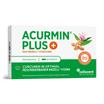

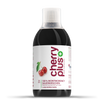

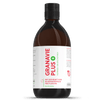
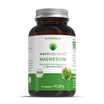
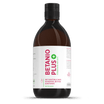




![MSM capsules [methylsulfonylmethane]](http://cellavent.de/cdn/shop/files/CH_essentials-MSM-kapseln-Produktbilder_2025_420x420.png?v=1770314779)